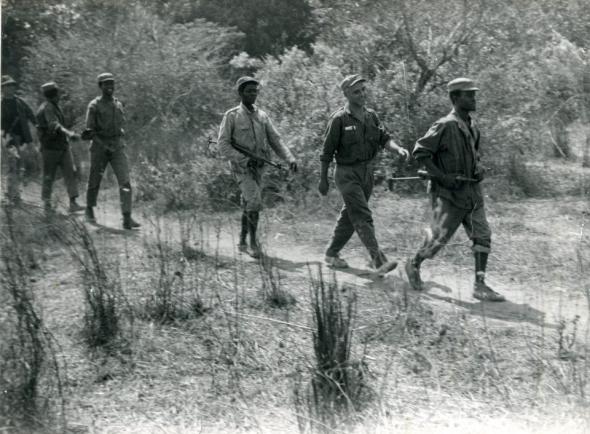Former Portuguese Colonies: Media and Decolonization
International conference (Dec. 12-13) / Film Retrospective (Dec. 10-13)
Rome, venues to be determined
The independence of the Portuguese colonies came at the end of the long process of decolonization of African nations: the last countries on the continent to free themselves from European colonialism were Angola, Cape Verde, Guinea-Bissau, São Tomé and Príncipe, and Mozambique between 1973 and 1975, after long wars against Portugal. After the 1974 Carnation Revolution in Portugal, former Portuguese colonies in Africa achieved independence, most recently Angola and Mozambique in 1975. Fifty years later, we want to remember these events by looking at them through the role of film and media.
In recent years, film and media studies has been increasingly concerned with anticolonialism, Third-Worldism, and internationalism, as part of a larger push to include topics such as migration, colonialism, and postcolonialism in this field. At the same time, scholarly investigations into the role of cinema during the Cold War are also finding new outlets particularly with regard to dynamics of transnational solidarity, internationalism, anticolonialism, and more generally the anti-imperialism of the long ’68. This conference takes its cue from these new areas of study, but seeks to approach them from an angle that has received relatively little attention: the relationship between the media (cinema, television, photography) and the former Portuguese colonies. Building on recent studies (such as those by Maria do Carmo Piçarra, Teresa Castro, Catarina Laranjeiro, and Ros Gray) and the recent rediscovering of the photographic and cinematographic work of Augusta Conchiglia, with this conference we aim to highlight these topics and to spotlight new, hitherto marginalized films that will be screened during the conference and in the days leading up to it. If in fact the works of foreign filmmakers such as Sarah Maldoror or Mario Marret, or of Angolan, Cape Verdean, Guinean, and Mozambican filmmakers (Ruy Duarte, among others) are relatively popular, practically unknown is the role of Italian filmmakers in narrating the wars of independence and their afterlives. The photographs of Uliano Lucas, Bruna Polimeni, Augusta Conghiglia, and movies like Labanta Negro! (Piero Nelli, 1966) circulated widely at the time, just as with the films by Valentino Orsini and Alberto Filippi (I dannati della terra, 1969), Lionello Massobrio, Joaquin Jorda, Elena Bedei, Sergio Spina (preserved at AAMOD, the Audiovisual Archive of the Workers’ and Democratic Movement in Rome), and even Carlo Lizzani, who in 1976 made a film for RAI on Angola, Black Africa, Red Africa.
Non-governmental organizations and Italian militants, filmmakers included, played an important role in the solidarity for and with the peoples struggling against colonialism, hosting, among other things, two conferences with the participation of former Portuguese African leaders (in Rome, 1970 and Reggio Emilia, 1973). Our conference aims to broaden the gaze and reopen the debate on the relationship between media (not only Italian) and former Portuguese colonies, in search of those “affinities”—or rather “intimacies” (according to Lisa Lowe’s definition)—between continents united in capitalist oppression and anticolonial solidarity.

We would like to solicit proposals in Italian or English that address queries around media and its relationship with the former Portuguese colonies. We suggest the following topics for participants to consider:
– Representations, renditions, and narratives of the wars of independence;
– Travels of filmmakers and photographer(s);
– Recycling and circulations of images;
– Internationalist solidarity through the media;
– Cinema’s role in Portuguese decolonization;
– Archives and methods of anticolonial studies and work;
– Feminist and gendered approaches to the colonial and anticolonial question;
– Reportage, investigations, and other forms of documentary filmmaking for television.
– We also invite artists to submit works of research-creation, or more generally works of creative artistic practices, that engage with the topics of this conference.
Have confirmed participation: Livia Apa (Centro Studi sull’Africa Contemporanea dell’Università di Napoli L’Orientale), Andrea Brazzoduro (Università degli Studi di Napoli L’Orientale), José Manuel Costa (Cinemateca Portuguesa, tbc), Ilaria Ferretti (Home Movies), Mario Lanzafame (archivist and researcher), Mariano Mestman (Universidad de Buenos Aires), Carlo Podaliri (archivist and researcher), Roberto Silvestri (film critic), Vincenzo Russo (Università degli Studi di Milano Statale), Masha Salazkina (Concordia University, Montreal), Mariamargherita Scotti (Istituto de Martino), Gabriele Siracusano (CNR e Fondazione Gramsci), Alessandro Triulzi (Università degli Studi di Napoli L’Orientale), and the filmmakers Elena Bedei, Filipa César, Augusta Conchiglia. The retrospective will include films (short, medium, and feature length) rarely screened and/or recently found.
Proposals for papers (20 minutes max.) for the Rome conference may be sent in the form of abstracts of 150-200 words, along with a brief bio (100 words max.) no later than September 22, 2023. The official language of the conference will be English, but there will be sections in Italian with simultaneous translation provided.
The conference is part of the project “A Forgotten History: Italian Cinema and the Decolonization of the Former Portuguese Colonies” promoted by AAMOD, and it is organized as part of the series “The Project and Forms of a Political Cinema.”
Convenors: Luca Caminati (Concordia University, Montreal), Damiano Garofalo (Sapienza University of Rome), Luca Peretti (University of Warwick), Paola Scarnati (AAMOD) with Maria do Carmo Piçarra (ICNOVA-UNL).
The conference is promoted by AAMOD, in collaboration of Fondazione Gramsci, Sapienza-University of Rome, Concordia University, Montreal, University of Warwick, in partnership with
ICNOVA-UNL, Cattedra Antonio Lobo Antunes (Università degli studi di Milano- Istituto Camões di Lisbona), Centro Sperimentale di Cinematografia – Cineteca Nazionale, Istituto De Martino, Centro Studi sull’Africa Contemporanea (CeSAC) dell’Università di Napoli L’Orientale, Centro Amilcar Cabral di Bologna, Fondazione Lelio e Lisli Basso onlus, Casa del Cinema di Roma, and Consulta Universitaria Cinema.

